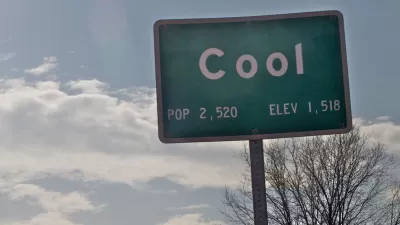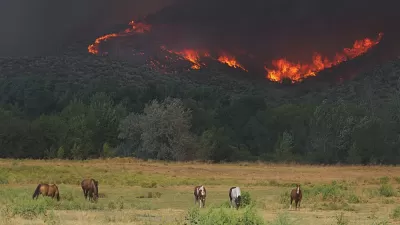AB 32, California's landmark climate change legislation, expires in 2020. Senator Fran Pavley (D-Calabasas), co-author of AB 32 in 2006, has teamed-up with Senator Ricardo Laro (D-Long Beach) to write a bill to continue emission reductions to 2030.
Senate Bill 1125 "is an effort by senators Fran Pavley and Ricardo Lara to get the legislature's blessing for an extension of the state's pioneering climate change efforts beyond the end of the decade," writes Rory Carroll. But unlike AB 32, also co-written by (then Assemblywoman) Fran Pavley and Assemblyman Fabian Nuñez, "it would leave details of how to achieve the state's goals to the California Air Resources Board, which is already working on a post-2020 climate change plan."
The bill directs state air regulators to recommend a timetable of post-2020 pollution reductions before January 1, 2016. That timetable is expected to include a 2030 emissions reduction target.
According to Sen. Pavley's press release, "In addition to greenhouse gases like carbon dioxide, the bill applies to short-lived climate pollutants such as black carbon and methane, which not only impact global warming but have also put the San Joaquin Valley, Los Angeles, San Diego and Sacramento out of compliance with the Clean Air Act."
Carroll writes that SB 1125 "reflects Lara's long running concern for residents in the state's most disadvantaged communities, where air quality tends to be worse." To that end, both senators have also introduced SB 1204 to focus on transportation emissions from two critical sources.
According to Lara's press release, the legislation "calls for the creation of a California Clean Truck and Bus Program to encourage zero- and near-zero emissions for buses and trucks handling goods movement...to clean up polluted transportation corridors throughout our state.” The program would be funded from cap and trade funds.
Finally, Carroll notes that AB 32 appears to be successful as shown by the state being "on track to meet its goal of cutting emissions back to 1990 levels by 2020, state officials said recently."
FULL STORY: California senators float post-2020 climate change bill

Maui's Vacation Rental Debate Turns Ugly
Verbal attacks, misinformation campaigns and fistfights plague a high-stakes debate to convert thousands of vacation rentals into long-term housing.

Planetizen Federal Action Tracker
A weekly monitor of how Trump’s orders and actions are impacting planners and planning in America.

San Francisco Suspends Traffic Calming Amidst Record Deaths
Citing “a challenging fiscal landscape,” the city will cease the program on the heels of 42 traffic deaths, including 24 pedestrians.

Defunct Pittsburgh Power Plant to Become Residential Tower
A decommissioned steam heat plant will be redeveloped into almost 100 affordable housing units.

Trump Prompts Restructuring of Transportation Research Board in “Unprecedented Overreach”
The TRB has eliminated more than half of its committees including those focused on climate, equity, and cities.

Amtrak Rolls Out New Orleans to Alabama “Mardi Gras” Train
The new service will operate morning and evening departures between Mobile and New Orleans.
Urban Design for Planners 1: Software Tools
This six-course series explores essential urban design concepts using open source software and equips planners with the tools they need to participate fully in the urban design process.
Planning for Universal Design
Learn the tools for implementing Universal Design in planning regulations.
Heyer Gruel & Associates PA
JM Goldson LLC
Custer County Colorado
City of Camden Redevelopment Agency
City of Astoria
Transportation Research & Education Center (TREC) at Portland State University
Jefferson Parish Government
Camden Redevelopment Agency
City of Claremont





























